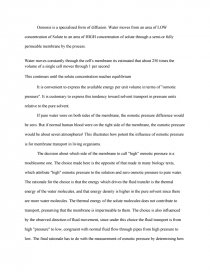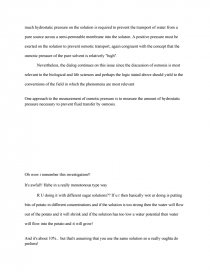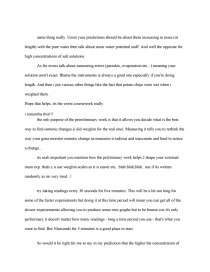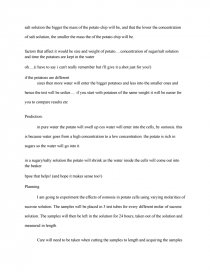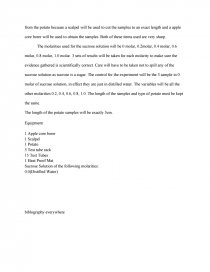Osmosis
Essay by review • February 18, 2011 • Essay • 1,234 Words (5 Pages) • 1,217 Views
Osmosis is a specialised form of diffusion. Water moves from an area of LOW concentration of Solute to an area of HIGH concentration of solute through a semi-or fully permeable membrane by the process.
Water moves constantly through the cell's membrane its estimated that about 250 times the volume of a single cell moves through 1 per second
This continues until the solute concentration reaches equilibrium
It is convenient to express the available energy per unit volume in terms of "osmotic pressure". It is customary to express this tendency toward solvent transport in pressure units relative to the pure solvent.
If pure water were on both sides of the membrane, the osmotic pressure difference would be zero. But if normal human blood were on the right side of the membrane, the osmotic pressure would be about seven atmospheres! This illustrates how potent the influence of osmotic pressure is for membrane transport in living organisms.
The decision about which side of the membrane to call "high" osmotic pressure is a troublesome one. The choice made here is the opposite of that made in many biology texts, which attribute "high" osmotic pressure to the solution and zero osmotic pressure to pure water. The rationale for the choice is that the energy which drives the fluid transfer is the thermal energy of the water molecules, and that energy density is higher in the pure solvent since there are more water molecules. The thermal energy of the solute molecules does not contribute to transport, presuming that the membrane is impermeable to them. The choice is also influenced by the observed direction of fluid movement, since under this choice the fluid transport is from high "pressure" to low, congruent with normal fluid flow through pipes from high pressure to low. The final rationale has to do with the measurement of osmotic pressure by determining how much hydrostatic pressure on the solution is required to prevent the transport of water from a pure source across a semi-permeable membrane into the soluton. A positive pressure must be exerted on the solution to prevent osmotic transport, again congruent with the concept that the osmotic pressure of the pure solvent is relatively "high".
Nevertheless, the dialog continues on this issue since the discussion of osmosis is most relevant to the biological and life sciences and perhaps the logic stated above should yield to the conventions of the field in which the phenomena are most relevant
One approach to the measurement of osmotic pressure is to measure the amount of hydrostatic pressure necessary to prevent fluid transfer by osmosis.
Oh wow i remember this investigation!!
It's awful!! Hehe in a really monotonous type way
R U doing it with different sugar solutions?? If u r then basically wot ur doing is putting bits of potato in different concentrations and if the solution is too strong then the water will flow out of the potato and it will shrink and if the solution has too low a water potential then water will flow into the potato and it will grow!
And it's about 10%... but that's assuming that you use the same solution so u really oughta do prelims!
same thing really. Umm your predictions should be about them increasing in mass (or length) with the pure water then talk about some water potential stuff. And well the opposite for high concentrations of salt solutions.
As for errors talk about measuring errors (parralax, evaporation etc...) meaning your solution aren't exact. Blame the instruments is always a good one especially if you're doing length. And then i put various other things like the fact that potato chips were wet when i weighed them.
Hope that helps, its the worst coursework really
i rememba this!!!
the onli purpose of the premliminary work is that it allows you decide what is the best way to find osmotic changes.(i did weighin for the real one). Measuring it tells you to rethink the way your gona monitor osmotic change as measurin is tedious and inaccurate and hard to notice a change...
its reali important you mention how the preliminary work helps 2 shape your eventual main exp. thats y u use weighin scales as it is easier etc.. blah.blah,blah.. soz if its written randomly as im very tired...!
try taking readings every 30 seconds for five minuties. This will be a bit too long for some of the faster experiements but doing it at this time period will mean you can get all of the slower experiemtents allowing you to produce some nice graphs but to be honest coz it's only perliminary it doesn't matter how many readings - long a time period you use - that's what you want to find. But 30seconds
...
...
